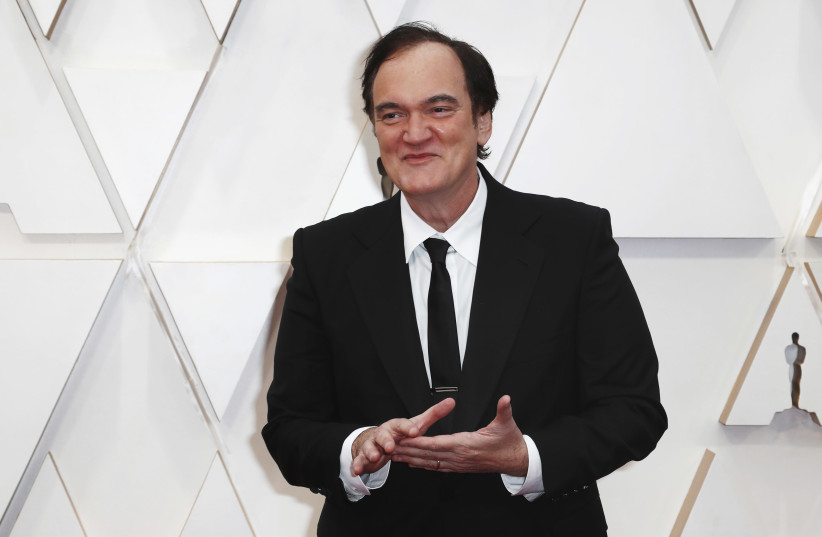The French daily Liberation recently published a rare and comprehensive interview with Quentin Tarantino, where the director discussed his life in Israel.
The conversation took place at the Cannes Film Festival, where the filmmaker was the guest of honor.
The French Riviera has a large Jewish population, with the newspaper noting that passers-by who spotted him asked him about life in Israel. His response: "I like being American."
Afterwards, interviewer Guillaume Gendron asked him to clarify.
Just like us: Quentin Tarantino lives in Israel but doesn't know Hebrew
Reportedly, Tarantino explained that since he doesn't speak Hebrew, he lives in his own bubble, cut off from Israeli culture.
Aside from that, Tarantino also discussed his imminent retirement from filmmaking, with his 10th film - which he is currently working on - set to be his swan song.

The filmmaker has already discussed in the past why he will stop directing, but decided to expand upon his reasonings.
"Usually, my answer is that I'll say directors don't get better as they get older. And seven times out of 10, I'm right. But really, that's an easy thing to say in an interview because frankly, I don't want to share with the world the nine other different thoughts I have about this - it's nobody's business," he said to Liberation.
"But the bottom line is that I've given this 30 years of my life, I gave it my all."
He continued: "I loved it all. But I've given it all. I left nothing on the table. I worked at the highest level of my art form. I want to leave a powerhouse legacy. I want to retire undefeated. Also it's kind of funny, because it sounds like 'Hollywood can reject you, but you can't reject them.' They can stop hiring you, that happens all the time, but god forbid walking away, on your own terms. That’s what I'm doing. Setting my own terms. Also, I'm getting older and the great thing about working on these books is that once I'm done working, it's done, I am done. On a script, you work, and work, and work, and when it's done, it just begins."
Tarantino proved his literary talent in the novelization of Once Upon a Time in Hollywood, published in Israel two years ago (full disclosure: The author of this article served as a consultant for editing the translation of his book into Hebrew).
This year, Tarantino published another book, a collection of essays on cinema titled Cinema Speculation - a hit in the US and France but which hasn't been translated into Hebrew
In addition to classic films from the 1970s such as Dirty Harry and Taxi Driver, which he praises but also criticizes, Tarantino devotes a chapter of his book to a film critic who admired his writing.
Tarantino's new film will be called The Movie Critic and will tell the story of a journalist in working in the 1970s. Filming is slated to start this fall with the movie expected to hit theaters in 2024.
Tarantino used to look at movie reviews, but that's no longer the case.
"I don't know how much is their fault and how much is my fault… I hear people around me say 'There are still good critics out there.' And I would say, who? Not being sarcastic. They would say 'Manohla Dargis [the New York Times' chief critic], she's a good critic.' And I'd say give me three movies she liked, and three movies she didn't in the last 8 years. And they can't do it. Why? Because, they don't care!" Tarantino explained to Liberation.
"Okay, if there is a New York Times sitting there, they would pick it up. But that's it. Whereas me, those writers [back in the day], I knew what they liked and didn't, I knew their voices, their tastes. And it's not me picking on Manohla Dargis, they can't do that about anybody. The bottom line is that I don't care enough about her voice to read about what she thought of Notes on a Scandal or the fourth Transformers movie."
And what does Quentin Tarantino think about modern-day cinema?
"It's not for nothing that all the movies I'm talking about are 40 years old or more," he explained. "I can't talk like that about new movies. That just wouldn't be fair. If I lay a ton of bricks on a filmmaker that made a movie last week, it's like I'm attacking them, jumping out of a bush with a hammer. It's just not f***ing fair. They're still my colleagues."
Tarantino did say there was a movie released in the past decade that especially annoyed him, but he refused to name it.
"I felt it was racist. And it just absolutely offended me. I had a knee-jerk reaction to it. I wanted to punch the director in the nose, but that was a bad reaction," he told Liberation. "I still think it’s a racist film. But it’s just a f***ing movie, man."
